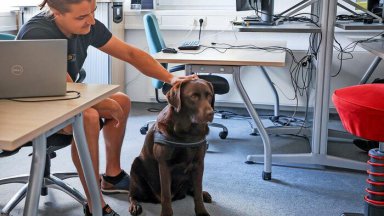Indra is a beastly good colleague
Dogs at work? That's not a problem at all at INOSOFT.
Marburg. Anouk toddles leisurely along behind her master. Before the dog sinks down on her blanket with a comfortable sigh, she happily greets her colleagues in the office with a wagging tail. "That's the ritual in the morning," Anouk's master Stephan Theiss explains with a smile. The 53-year-old works as a consultant at the Marburg-based IT company INOSOFT and is one of seven employees who regularly or occasionally bring their dogs to the office.
Dogs at work? That's not a problem at all at INOSOFT. And that's because of the boss herself. Dog Indra doesn't leave Karin Batz's side when the co-founder of INOSOFT walks through the modern offices of the company's headquarters in Cappel. As part of the company's three-member board of directors, she was the first to bring a dog to work years ago. "Then, when many colleagues also asked if they could bring their dog, it was a matter of course. Equal rights for all," says Batz, petting her black dog's silky coat.
With its unequivocal yes to the office dog, the company has hit the nerve of the times. According to the German Animal Welfare Association, more and more companies are now showing tolerance toward their animal colleagues. No wonder, numerous studies prove the positive effects of the animals on the working atmosphere: humans, who share their work routine with a four-legged friend, feel clearly less stressed and can concentrate better when working, so the tenor.
This can also be confirmed by Stephan Theiss, for whom it is very important to be able to take his dog to work with him. "The colleagues always laugh when the dog lies behind me and then starts snoring. That loosens up the working atmosphere," he says happily.
Even the employees who don't have dogs themselves are happy when Anouk and Co. want to be petted. No wonder. When interacting with animals, the human body releases the "cuddle hormone" oxytocin. This has been shown to lower blood pressure, make the heart beat more slowly, and help reduce the stress hormone cortisol.
"I think the presence of the dogs generally lifts the mood in the company," says Mirko Hartmann, patting Greta's head affectionately. His canine lady has just picked up the remains of an apple from a colleague at work. "That's what they always do. He eats the apple, Greta what's left over," says the consultant, who is grateful that he can bring his dog to work with him. Walking in the fresh air during the lunch break is also rated in studies as a good prophylaxis against burnout. The conclusion of numerous surveys makes it clear: having a dog in the office has exclusively positive effects.
But you can't just bring your four-legged friend along. The legislator has clearly regulated the topic of "dogs in the office": If a dog wants to be taken to work, then the prior consent of the employer is mandatory. Of course, consideration must also be given to colleagues with less affinity for dogs. And there the education of the own four-legged friend may not be disregarded. "The dogs must be able to behave, a certain basic education is already necessary," explains Batz.
In addition, it must also be clarified that a person with a dog hair allergy is not sitting in the same office with a dog. "But I already pay attention to that during the job interviews," says Batz, but emphasizes that a dog hair allergy is of course not a criterion for exclusion from employment. The top priority is always the work. "After all, we are an IT company, not a dog school," she says with a wink.
Source reference: Oberhessische Presse from 16.06.2023
June 23, 2023



